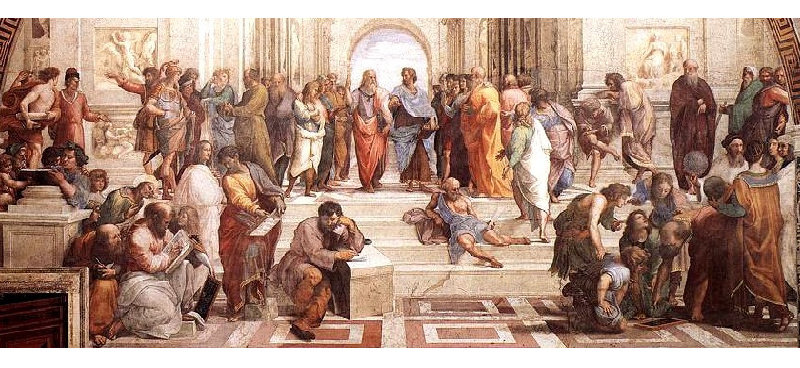In primitive times, knowledge was considered equal by all, and anyone could become a tribal leader, judge, or professor. However, over time, people began to differentiate between types of knowledge, and job specialization eventually changed the structure of society.
Before entering the era of Ancient Greece, people used myths and legends as justification for natural phenomena. For example, lightning was considered the wrath of the god Thor. But during the development of Greek philosophy, people began to use common sense to seek answers to natural events.
Philosophers such as Thales, Anaximander, Anaximenes, and Pythagoras talked about the fundamental principles that underlie everything. Some referred to water, others to aperion (something limitless), and others to air. Some also spoke of numbers and elements called atoms.
After that, people began to question whether reality was changing or constant. Heraclitus said that everything flows and nothing stays, while Parmenides stated that reality is unchanging and constant. Democritus himself believed that reality consists of many elements called atoms.
Socrates became an important figure during this era. He used dialectical methods to foster knowledge in the minds of others. He did not convey knowledge, but through his questions, he tested the value of ideas that had already been born. The tradition of dialogue in philosophy was continued by Socrates' disciple, Plato.
So, in ancient Greece, philosophical thinking and scientific knowledge were not separated. However, during the Middle Ages, philosophical thinking was mixed with religion and regarded as the same as church dogma. Anything said by the church was considered correct at that time when Christianity was in its golden age in Europe.
But then the Renaissance in the 15th century and Enlightenment in the 18th century made philosophical thinking different from religion. The Renaissance was a period that focused heavily on art, architecture, music, literature, science, technology, and, of course, philosophy. At that time, free thinking was encouraged without fear of punishment from the church. Bold thinking that challenged dogma could change thinking patterns and produce new thinking in philosophy.
One of the thinkers was Aristotle, who is known for his theory of the causes of the objects studied. He said there were four causes, namely the material, formal, efficient, and final causes. Aristotle had a major contribution to science.
In the Renaissance, several important figures were born who opposed church dogma, such as Nicolaus Copernicus, who challenged the theory of Ptolemy believed by the church, that the earth was the center of the universe. Copernicus argued that the sun was the center. There were also other figures like Francis Bacon, Galileo Galilei, and Thomas Aquinas. So the Renaissance was like a time of rebirth of freedom of thought.
The history of Western philosophy can be divided into four distinct periods. Each period has dominant characteristics of thinking at that time.
During Ancient Greece, people were very interested in the origin of the universe and the cosmos. They created cosmocentric thinking to understand this.
While in the Middle Ages, philosophical thinking was closely related to Christianity. This caused philosophers to use their thinking to strengthen religious dogmas.
In the Modern Era, philosophical thinking was more focused on humans as the center of analysis. However, philosophy began to separate from science which had developed rapidly.
In the Contemporary Era, philosophers were more interested in analyzing texts as the central theme of discourse. This is known as logocentric.









.jpg)




